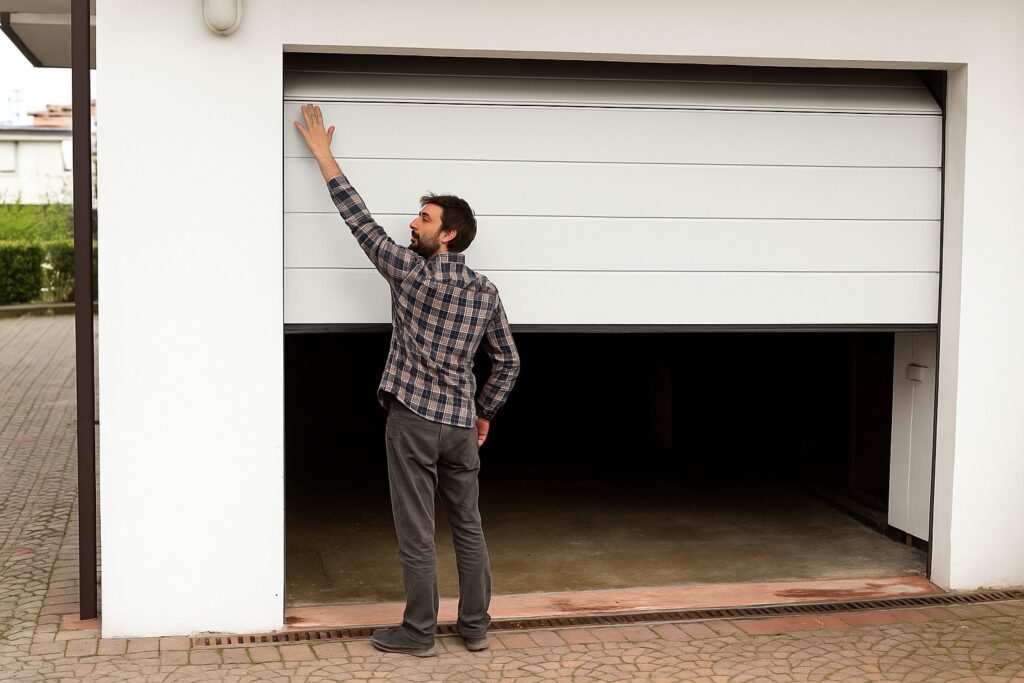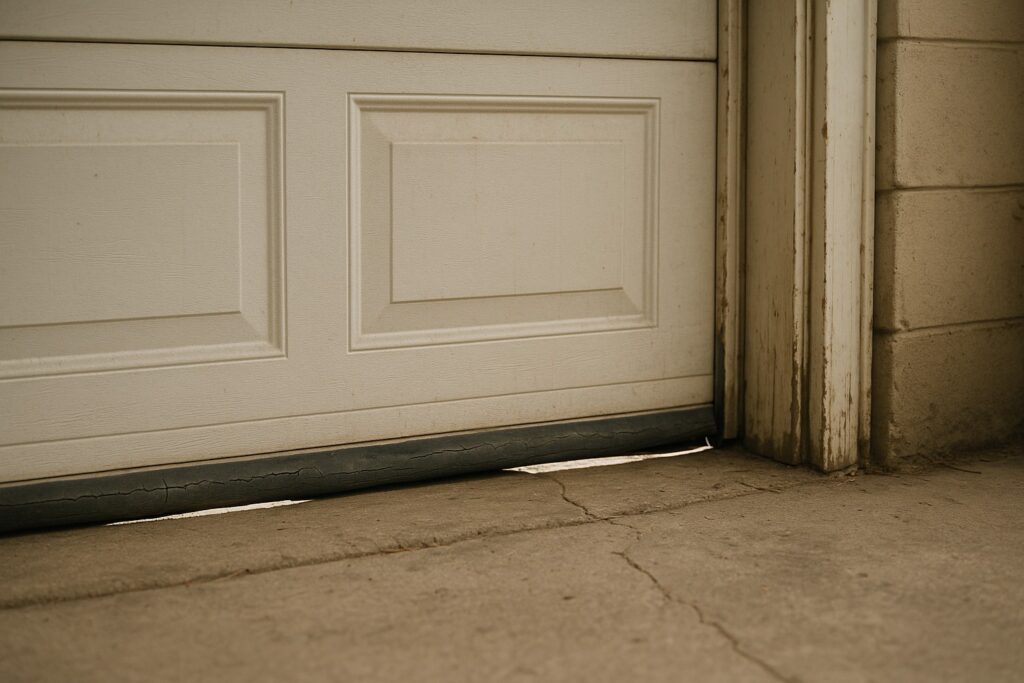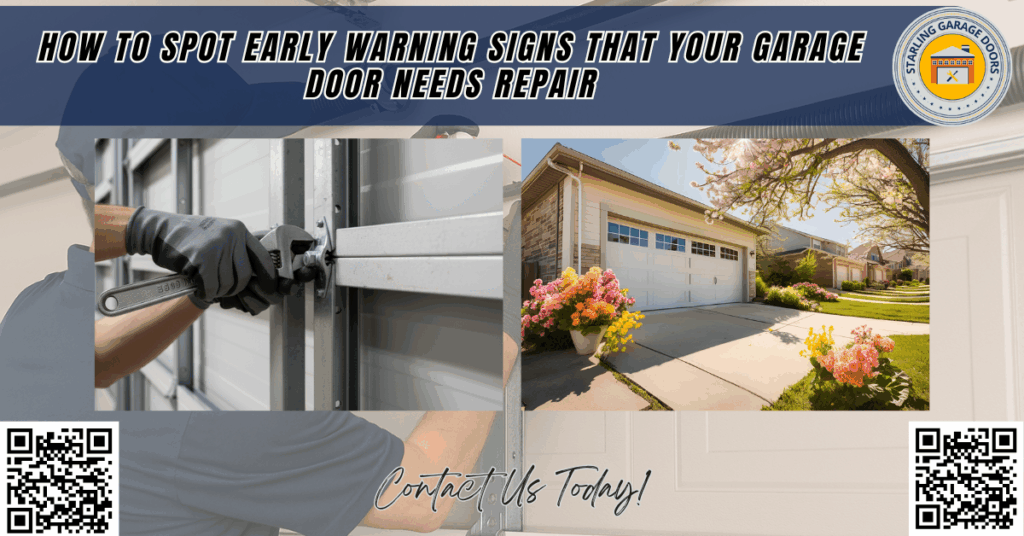Garage door repair is one of those things most homeowners do not think about until the door stops working right when they are already late for school or work. At Starling Garage Doors, we have seen that moment more times than we can count. Picture this: a family in Conroe is heading out for the day, the garage door starts going up, then jerks hard, makes a loud bang, and slams back down. Nobody got hurt, but the door was one small step away from a spring failure that could have caused real damage. The good news is that this kind of problem almost always gives warning signs first.
Here is a surprising statistic that sticks with us. Many garage door issues start small, like a loose roller or a slightly worn cable, but they can turn into costly repairs if they are ignored for even a few weeks. A garage door is the largest moving part of most homes. It can weigh anywhere from 150 to 400 pounds, and every time it moves, parts like springs, tracks, and openers are doing heavy work. That is why early detection matters so much.
Think about your garage door like your car. If your car squeals when you brake, you do not wait for the brakes to stop working completely. You get service before the job becomes riskier and more expensive. The same logic applies to your garage door. In this guide, we will walk through the early warning signs, explain why they happen, and show what you can do next. Whether you live in Conroe, Houston, or nearby neighborhoods, this is designed to help you protect your home, save time, and avoid sudden breakdowns.
Why Catching Early Warning Signs Matters
A garage door system has many parts working together. You have springs that carry the weight, cables that guide movement, rollers that glide along tracks, hinges that keep sections aligned, and the garage door opener that controls the whole operation. If one part is in poor condition, the rest of the system feels the strain.
Catching problems early helps in three big ways.
- First, it protects safety. A broken spring or snapped cable can cause the door to fall fast. That is dangerous for people, pets, and vehicles.
- Second, it prevents bigger repair needs. A small alignment issue today can become a full track replacement job later.
- Third, it saves money. Early garage door repair usually means replacing one worn part instead of several damaged parts.
Regular maintenance services and a thorough inspection from skilled technicians are the best ways to spot these issues. But you can also learn to notice the warning signs yourself.
Warning Sign 1: New or Unusual Noises
One of the earliest and easiest signs to notice is sound. Garage doors are not silent, but they should sound smooth and steady.
What you might hear
- Grinding or scraping
- Squeaking or squealing
- Popping or banging
- Rattling or shaking noises
What it often means
Grinding can point to worn rollers or bent tracks. Squeaking is often a lubrication problem or a hinge wearing out. Popping sounds may mean spring tension is uneven. Rattling can mean loose hardware.
What to do
Try to listen carefully each time the door opens or closes. If the sound is new, louder, or happens in the same spot every time, that is a clear repair signal. A little lubrication can help if the system is otherwise healthy, but if the noise keeps coming back, a service man or an expert team should check it.
Warning Sign 2: Slow or Uneven Movement
A garage door should open at a steady speed, not crawl or rush.
What you might see
- The door takes longer than usual to open
- It moves in a jerky way
- One side looks higher than the other
- It pauses halfway

What it often means
Slow movement can be tied to opener trouble or worn springs. Uneven movement usually points to cable issues or track alignment problems. A pause halfway may mean the opener is sensing resistance.
Why it matters
Uneven movement is a big early clue. When weight is not balanced, springs and cables are forced to work harder and may break sooner.
What to do
Do not keep forcing the door. Call for garage door repair before the system fails fully. A quick appointment can keep the job small.
Warning Sign 3: The Door Feels Heavy
If you ever lift the door manually and it suddenly feels heavier than before, pay attention.
What it often means
Garage door springs are losing strength. Springs are designed to do most of the lifting. When they weaken, the opener has to lift more weight, which wears out openers faster and can lead to a broken garage door.
What to do
This is not a do-it-yourself spring job. Springs are under high tension and can cause injury if handled without the right tools and experience. A trained technician should replace springs safely.
Warning Sign 4: The Door Does Not Stay Open
A healthy door should stay open on its own.
What you might see
- The door drifts downward after opening
- It closes suddenly unless the opener holds it
- It stops in odd positions
What it often means
This is a classic spring balance issue. Springs may be worn, stretched, or broken. It can also happen when cables are uneven.
What to do
Stop using the door until it is checked. This warning sign can turn into a dangerous failure quickly. Get repair services right away.
Warning Sign 5: Cables Look Frayed or Loose
Look at the cables beside the door. They should appear tight and clean.
What you might see
- Frayed strands
- Rust spots
- Slack or sagging
- Cables jumping off the pulley
What it often means
The cables are wearing out, or the spring balance is wrong. Rust speeds up cable failure and can affect the entire garage door system.
What to do
Do not touch or try to tighten cables yourself. A professional garage door company should handle it. If a cable snaps, the door can fall.
Warning Sign 6: Rollers Are Worn or Off Track
Rollers keep the door moving along the tracks.
What you might notice
- The door wobbles side to side
- Rollers look cracked or chipped
- The door jumps in the tracks
- You see debris in the track area
What it often means
Old rollers may be wearing down, or the track may be bent. If the rollers slip out, the door may get stuck at an angle.
What to do
This is a good moment for a thorough inspection. A simple roller replacement can prevent bigger track repairs later.
Warning Sign 7: Tracks Are Bent, Rusty, or Misaligned
Tracks guide the door straight up and down.
What you might see
- Dents or bends
- Rust flakes
- Gaps between rollers and track
- The door is rubbing the rail
What it often means
Tracks may have shifted over time, especially if the door has been bumped by a car or heavy object. Rust can cause friction and limit smooth operation.
What to do
Track alignment should be handled by skilled technicians. Forcing a misaligned track can cause the door to derail.
Warning Sign 8: The Opener Struggles or Stops
A garage door opener should run smoothly without strain.
What you might notice
- The opener motor hums, but the door barely moves
- The door reverses for no reason
- The opener stops before the door fully closes
- The remote work is only sometimes
What it often means
The opener could be wearing out, sensors may be dirty, or springs may be placing too much demand on the motor. Sometimes it is a simple fix. Sometimes it is a sign that a new garage door opener is needed.
What to do
Check the sensors first for dirt or misalignment. If that is not the issue, schedule service. Opener problems often connect back to deeper mechanical strain.
Warning Sign 9: The Door Reverses or Will Not Close Fully
If your garage door reverses direction while closing, something is wrong.
What it often means
Safety sensors might be triggered or misaligned. It can also mean track resistance, worn rollers, or opener force settings that are off.
Why it matters
A door that will not close leaves your home exposed. It can also stress the opener and parts.
What to do
Clean sensors and remove any objects blocking the path. If the problem keeps happening, call your local garage door experts.
Warning Sign 10: Visible Gaps Around the Door
When the door is closed, it should seal fairly tightly.
What you might see
- Light coming through the sides or the bottom
- Air drafts
- Water leaks in during storms
- Pests are finding their way inside

What it often means
Weather seals may be worn, the door may be uneven, or the tracks might not be aligned correctly.
What to do
Sometimes this is a seal replacement job. Other times it points to structural alignment problems. Either way, early repair helps protect your garage, your home, and your energy bills.
Warning Sign 11: Shaking or Vibrating When Moving
A door should not look like it is struggling to stay on its path.
What it often means
Loose hardware, worn rollers, or track alignment issues. Shaking also happens when sections are not lined up right, especially on older doors.
What to do
A technician can tighten, realign, or replace the right parts. Letting shaking continue can damage hinges and panels.
Warning Sign 12: Sagging Door Sections
Over time, door sections can sag.
What you might notice
- One section looks lower than the others
- The top row bends inward
- The door appears uneven when closed
What it often means
Hinges may be worn or panels may be weakening. This is common on wooden doors, older models, and doors that have not had regular maintenance.
What to do
Do not wait. Sagging sections can lead to bigger door replacement needs.
Warning Sign 13: Rust, Cracks, or Wear on Springs
Springs are the heart of your garage door system.
What you might see
- Rust on the spring coil
- Gaps between coils
- Cracks forming
- A spring that looks stretched out
What it often means
Rust weakens springs. Gaps or stretching often show that the spring is close to breaking.
What to do
Call for garage door repair immediately. Springs generally last many years, but once wear shows, time is running short.
Warning Sign 14: Frequent Small Issues
Sometimes the biggest warning is a pattern.
Examples
- You reset the opener often
- The remote loses connection
- The door sticks more than once a week
- You need to push the door to help it move
What it often means
The whole system is drifting out of correct operation. Even if each issue feels small, together they signal a bigger repair need.
What to do
Schedule a full door service check. It is like getting a car tune-up instead of waiting for a breakdown.
What Causes These Problems in the First Place
Understanding the root causes can help you prevent future issues.
Normal wear over the years
Garage doors open and close thousands of times. Springs and rollers have a cycle life. They wear out slowly.
Lack of lubrication
Tracks, rollers, and hinges need proper lubrication to avoid friction damage.
Weather and moisture
Humidity, heat, and storms can cause rust and swelling. Even in Texas, heavy rain can speed up wear.
Accidental impact
A bump from a car or heavy object can knock tracks out of alignment.
Cheap or mismatched parts
Using low-quality parts or mixing brands incorrectly can reduce performance. A precision garage door setup needs the right match of parts and tension.
Simple Steps You Can Take at Home
You do not need to be a technician to do basic checks.
Monthly visual scan
Look at springs, cables, rollers, and tracks. If anything looks frayed, cracked, loose, or rusty, schedule repair.
Test balance
With the door closed, disconnect the opener and lift the door halfway. If it drops or rises quickly, the springs need service.
Keep sensors clean
Wipe safety sensors so they continue to work properly.
Listen for changes
Sound is one of your best early warning tools.
These steps do not replace professional repair and maintenance, but they help you catch early signs before they grow.
When to Call the Pros Right Away
Some issues should never be delayed.
Call for garage door repair today if:
- Springs show gaps or cracks
- Cables look frayed
- The door will not stay open
- The door is off track
- You hear loud bangs or snapping sounds
This is not about being nervous. It is about being safe and smart. We have handled emergency garage door calls in Conroe, Houston, and nearby areas, and most emergencies started as smaller warning signs.
A Note on Service Areas and Industry Terms
You may have seen terms like Conway garage door, Myrtle Beach garage, Grand Strand garage, Horry County, Carolina Forest, North Myrtle Beach, Crescent Beach, Surfside Beach, Garden City Beach, Ocean Isle Beach, Little River, Loris, Aynor, and Georgetown used in garage door articles online. Those are popular service terms in other regions, like coastal Carolina communities. We mention them here because many homeowners search for these phrases when learning about doors and repairs, and the warning signs are the same everywhere. Whether you are in Texas or along the beach, a garage door still depends on springs, openers, tracks, and safe operation.
What matters most is finding an expert team with real experience, high-quality parts, and a focus on customer care. That is what we provide locally in Conroe and the surrounding Houston area.
Frequently Asked Questions (FAQs)
1. How long do garage door springs usually last before they need replacement?
Most torsion and extension springs last around 7 to 9 years, depending on how often you open and close the door and whether you keep up with maintenance. If your door gets heavy sooner than that, the springs may be wearing out faster than expected.
2. Can I do garage door repair myself, or should I always call a professional?
Small tasks like cleaning sensors or adding lubricant are usually okay for homeowners. But anything involving springs, cables, or tracks should be handled by trained technicians because those parts are under high tension and can be dangerous.
3. About how much does a typical garage door repair cost?
Costs vary a lot based on the problem, but simple fixes like sensor adjustments or roller swaps are usually cheaper than spring or opener repairs. The best way to know your exact price is to get a quick inspection and quote from a local garage door company.
4. What type of lubricant should be used on a garage door, and how often?
Use a garage door–safe lubricant like silicone spray or lithium-based grease, not heavy oils that collect dust. Most homeowners should lubricate rollers, hinges, and springs every 3 to 6 months to keep smooth operating.
How Can Starling Garage Doors Help You?
If you have noticed any of these warning signs, you do not have to guess what is wrong. Starling Garage Doors is here for homeowners and businesses who want safe, reliable, and long-lasting garage door services.
Here is what we offer:
- Full garage door repair for broken springs, worn rollers, damaged tracks, and malfunctioning openers
- Garage door installation services for new garage doors in both residential and commercial garage door settings
- Ongoing maintenance services and regular maintenance plans to keep your door in top condition
- Expert troubleshooting for any brand, including Craftsman systems, American garage door style setups, and modern smart openers
- Friendly scheduling with flexible appointment options and clear answers to your questions
Our technicians are trained, careful, and focused on doing the job right the first time. We bring precision, know-how, and the right tools to every work site, whether it is a home garage or a busy business location.
Call Starling Garage Doors today at (281) 699-5883 to book your service or inspection. You can also visit us at 2514 Vaughn St, Houston, TX 77093. If your door needs a quick fix, a new opener, or a full system upgrade, we are ready to help you get back to smooth and safe operation.
Final Thoughts
Your garage door is not just a convenience. It is a major part of your home’s security, safety, and daily routine. The good news is that most serious problems do not happen without warning. Noises, slow movement, heavy lifting, frayed cables, worn rollers, and opener struggles are all early signs that garage door repair may be needed soon.
When you spot these signs early, you protect your family and your property. You also avoid bigger repair bills and sudden emergency breakdowns. A few minutes of attention each month, plus regular professional maintenance, can keep your garage door working smoothly for years.
If you are unsure about what you are seeing or hearing, trust your instincts and get a professional opinion. It is always better to schedule a repair check while the issue is small. Contact us today, and Starling Garage Doors will be glad to take a close look and walk you through the best next step. Starling Garage Doors is proud to serve Conroe, Houston, and nearby communities with dependable garage door services built on quality, experience, and real customer care. We are here when you need us, and we are ready to keep your door safe, strong, and reliable for the long run.

